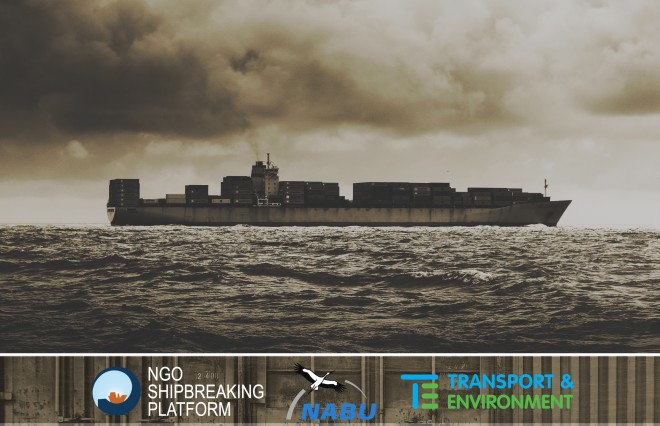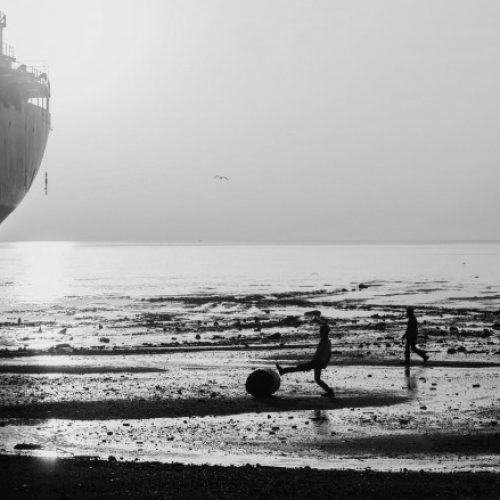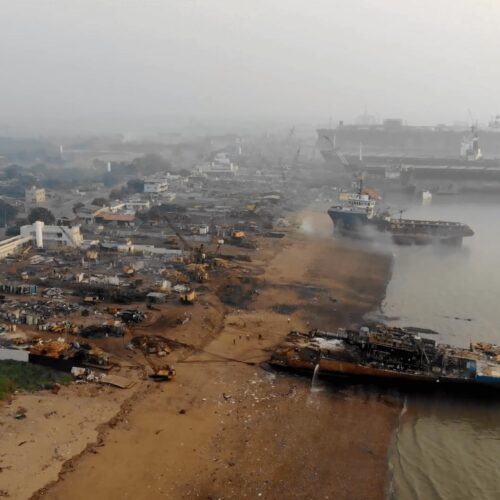Press Release – EU’s leverage & insurance policy on dirty shipping needed
Environmental NGOs call upon the EU to effectively regulate ship borne pollution
From dangerous emissions in ports to hazardous scrapping on South Asian beaches, European shipping companies pollute and put people’s health and lives at serious risk. In light of the ongoing European Shipping Week and the failure of the International Maritime Organisation to find solutions, environmental experts are ringing the alarm bell and calling upon European policy makers to urgently adopt policies that effectively target the environmental performance of shipping.

Burning heavy fuel without any exhaust gas aftertreatment systems is shockingly still standard practice on open sea, despite both regulatory and technical means at hand to limit the threat to human health, environment and global climate caused by such shipping emissions. The EU must take a lead by designating all its waters as emission control areas for ship born sulphur, nitrogen and particle emissions. Such a step would not only lead to a significant uptake of cleaner fuels but also enable the use of particulate filters and nitrogen catalysts, therefore reducing air pollution levels in port cities and along shipping routes significantly. The EU must also back the growing calls [1] for an international ban on the use of heavy fuel oil by Arctic shipping by 2020.
Shipping mind-bogglingly remains the only sector of the economy not contributing to EU climate targets and yet it is uncontestably an industry responsible for emitting significant amounts of CO2. Forecasts show EU-related ship CO2 emissions will increase by 86% in 2050 compared to 1990 levels. By 2050, international shipping could be responsible for 17% of global CO2 emissions if left unregulated. Environmental NGOs therefore welcome that the European Parliament has decided to include shipping in the EU Maritime Climate Fund/ETS from 2023 if the International Maritime Organisation (IMO) fails to deliver on a global deal.
Devastating human and environmental impacts are also caused by ships at the end of their operational life. European ship owners shamefully continue to top the list of companies that sell their ships for dirty and dangerous scrapping on beaches in South Asia [2]. A new EU law aims to ensure that EU-flagged ships are recycled in EU-approved facilities. However, in a system where owners can easily swap the flag of their ship and where all vessels sold to South Asia pass through the hands of cash-buyers - middle men specialising in hazardous waste trafficking - legislation based on flag state jurisdiction will be easy to circumvent.

International shipping laws rest on enforcement by flags of convenience, such as those of Panama and Liberia and Paris MoU grey- and black listed flags at end-of-life. Solutions to curb dirty shipping will need to be ascertained by the EU. Since it controls 40% of the world fleet and is a major trading destination, there is no reason why the EU should be timid in this role.
NOTES
[1] The Arctic Commitment, an initiative by the Clean Arctic Alliance, aims to protect Arctic communities and ecosystems from the risks posed by the use of heavy fuel oil as marine fuel. For more details see www.hfofreearctic.org
[2] For a list of all ships sold for scrap in 2016, see www.shipbreakingplatform.org/press-release-platform-publishes-list-of-ships-dismantled-worldwide-in-2016/
Related news

Press Release – Toxic aircraft carrier dangerously drifting after weeks at sea
The toxic waste-laden aircraft carrier São Paulo is still drifting more than 12 miles off the coast of the State of Pernambuco.
... Read More
Press Release – Turkish authorities ban the entrance of toxic aircraft carrier São Paulo
Turkey has finally banned the toxic aircraft carrier SÃO PAULO from entering its national waters.
... Read More
Press Release – Container shipping asked to clean up its act in view of upcoming scrapping wave
Numerous container ships are predicted to be sold for scrapping in the near future.
... Read More
Platform News – NGO Shipbreaking Platform presents Annual Report 2015
The NGO Shipbreaking Platform presents its Annual Report 2015. Check the new Annual Report to find out more about: – our findings about global shipbreaking practices in… Read More

Press Release – NGOs warn that Hong Kong Convention will fail to ensure sustainable ship recycling
Treaty to continue toxic business-as-usual on the Beaches of South Asia while undermining efforts for reform.
... Read More
Press Release – Maersk end-of-life vessels to hit the beaches again. NGOs denounce container ship company’s step back to boost profits
The NGO Shipbreaking Platform and Transport and Environment (T&E) denounce Maersk Group’s decision to beach their end-of-life vessels in India [1]. The world’s leading container ship owner… Read More


